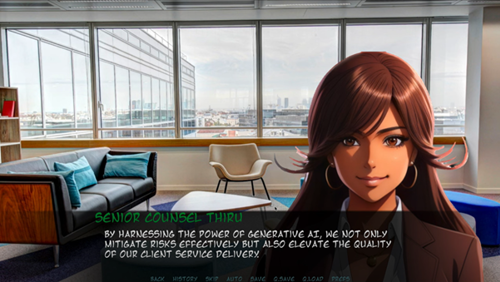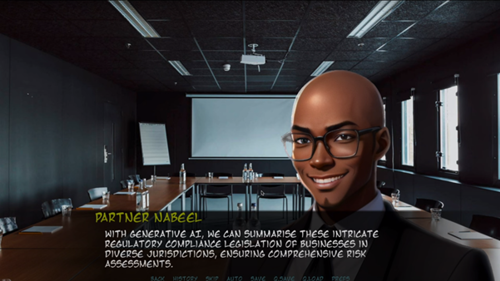Slaughter and May announces winner of 2024 student Innovation Competition
Competition winner will receive £1,000 and a work experience placement at the firm
Slaughter and May has announced the winner of the firm’s Innovation Competition for students. The winner was Yusuf Zaman, whose visual novel explored how law firms could use generative AI in their M&A practice. Yusuf will receive £1,000 and will be joining the firm for a week’s work experience in its Client & Practice Solutions team later this year.
Students could choose to answer one of two questions on the topic of generative AI. Entries were judged on their creativity, originality, commercial awareness and strength and clarity of argument. Students were invited to respond to these questions in any format they deemed appropriate. Entries this year included apps, games, narrated presentations, podcasts, and essays, amongst other formats.
The firm received close to 70 entries which were then shortlisted by a panel made up of members of the Client & Practice Solutions team, Legal Project Management team and a member of the firm’s Innovation Network.
In addition to the £1,000 prize and work experience placement awarded to the winner, the second and third place entries were awarded £500 and £250 in prize money respectively.
Legal Project Manager David Kitchen, who was also part of the judging panel, said: “I really enjoyed reviewing the entries this year. The quality was high, showing a great deal of creativity both in terms of the ideas that were presented and the formats. Well done to all who entered.”
Reflecting on the winning entry Emily Lew, Senior Client & Practice Solutions Manager said “We were really impressed by the winning entry, especially by the visual novel format. Yusuf demonstrated great commercial awareness and attention to detail. It was innovative and fun to watch - a thoroughly deserved win!”
The winners were as follows:
First place: Yusuf Zaman (studying Politics at Queen Mary, University of London) who produced a visual novel in response to the question “Pick a practice area of your choice and explain a potential use case for generative AI, setting out how and why it will add value to the firm and its clients.” The judging panel felt the format really brought the answer to life.
Snippets of conversations with a senior counsel and partner taken from Yusuf’s visual novel.


Second place: Lara Ozyer (studying Law at City, University of London) who produced a game in response to the question “What are the cultural challenges with integrating generative AI into a law firm? What are the best ways for Slaughter and May to approach these challenges to maximise the successful integration of generative AI across the firm?” Lara’s game was a fun and effective way of exploring the themes in the question.
Third place: Emma Cooney (studying Law at the University of Edinburgh) with a narrated presentation in response to the question “Pick a practice area of your choice and explain a potential use case for generative AI, setting out how and why it will add value to the firm and its clients.” The judging panel felt Emma showed creativity of thought in the litigation use case which she chose.
Highly commended: Alicia Smith (studying Law, at the University of Manchester) with a presentation and podcast in response to the question “Pick a practice area of your choice and explain a potential use case for generative AI, setting out how and why it will add value to the firm and its clients.” Alicia’s entry must be commended for its wide range of examples of how generative AI could be applied in practice.